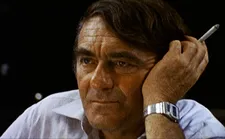 |
| Claude Lanzmann: Spectres of the Shoah director Adam Benzine: “It’s really a film about how Shoah was the making of Claude Lanzmann.” Photo: Anne-Katrin Titze |
When Claude Lanzmann passed away in Paris on the morning of July 5, 2018, Arnaud Desplechin and Antonin Baudry sent tributes in honour of the man who directed the documentaries Shoah, The Last Of The Unjust, Napalm, Israel, Why, and Shoah: Four Sisters (Les Quatre Soeurs). Adam Benzine’s revealing Oscar-nominated Claude Lanzmann: Spectres of the Shoah shows us the man who was behind the making of one of the most important films in the history of cinema.
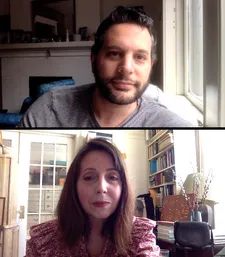 |
| Adam Benzine with Anne-Katrin Titze on Claude Lanzmann: “He fought in the resistance as a teenager, he was a lover of Simone de Beauvoir, he was in Algeria with Sartre and Nelson Algren.” |
After Adam interviewed Albert Maysles, Robert Drew, Michael Apted, D A Pennebaker for a book on documentarians, he was told: “You’ve got to include Claude Lanzmann!” In an article in Der Spiegel he read that Lanzmann was a member of the French Resistance, lover of Simone de Beauvoir, and that he joined Jean-Paul Sartre and Nelson Algren in Algeria. Adam approached BBC Storyville’s Nick Fraser with an offer: “Look, 2015 will be the 30th anniversary of Shoah, so you should program it. It hadn’t been shown on British television since 1987. I’ll do a new documentary to go with it.”
From Vancouver, Toronto based documentarian Adam Benzine joined me on Zoom for an in-depth conversation on Claude Lanzmann: Spectres Of The Shoah and the man behind the masterpiece.
Anne-Katrin Titze: Hello Adam!
Adam Benzine: Hi Anne-Katrin, your apartment looks quite sunny and lovely.
AKT: It’s quite sunny today. Yours is not so sunny?
AB: No, I’m in Vancouver and it’s ugly and grey here.
AKT: How is it otherwise? How is Vancouver dealing with the pandemic?
AB: I mean, I live in Toronto, but since January I’ve been here in Vancouver subletting an apartment. Everything is open here and there’s very little COVID. Whereas in Toronto everything has been shut down and is pretty much still shut down and COVID numbers are really bad and the temperature is minus 20.
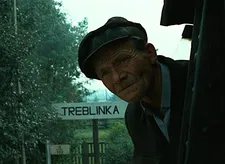 |
| Adam Benzine on Shoah and Claude Lanzmann: Spectres of the Shoah: “One thing they do share in common is that they take people back into memory.” |
AKT: You made a good choice then! Let’s talk about your film. You managed to pack an awful lot into 40 minutes. A lot of Claude Lanzmann. What is in Shoah and what isn’t in Shoah. I was quite amazed.
AB: Thank you, that’s very kind. I’m very proud of that film. Sometimes people say to me, “so it’s a film about the making of Shoah.” And I often say to them it’s really a film about how Shoah was the making of Claude Lanzmann. One of the things I always draw people’s attention to is at the beginning when you see some footage from Pourquoi Israël (1973), how happy he is, how he’s smiling in all of these clips. He’s excited, he’s a young journalist making his first film. And you compare that with the near constant grimace as he is making Shoah. And you see the way it changed him, by the end in 1985 when he sits down for that interview with PBS. It really broke him and in some ways he never quite recovered from it.
AKT: That’s very interesting. I just had an idea while you were talking. He said “Shoah does not age.”
AB: Yeah.
AKT: But he did. I was thinking of The Picture Of Dorian Gray. The opposite of that, actually. He made this monumental film that stays the same forever.
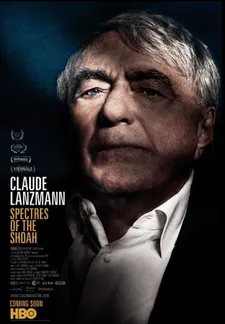 |
| Claude Lanzmann: Spectres Of The Shoah poster available April 7 on HBO VOD |
AB: Yes, the eternal present, as he considered the Holocaust. I push back a bit when people draw parallels between his film and my film because they are very different obviously. Very different in style and in goals. His is this broad epic and mine is a short biographical film, largely based on the subject of the film, him. But one thing they do share in common is that they take people back into memory and whilst he does that physically - takes survivors literally back, puts them in a boat and makes them go back down the river, puts a guy who drove a train back on a train and makes him go back and puts scissors in the hands of a barber and makes him cut hair again - I obviously did that in a more controlled but defined way, making him relive memories that were really a key point in his life, which made a big impact on him and which he didn’t always want to revisit. Some of them were really unhappy. Shoah was such a success but the process of making it was such an unhappy experience for him.
AKT: You are poking at him in a way that shows how much you know Shoah. There is a nice interplay there. The lies are what he mentions very profoundly, how much the lies were weighing on him. The lies he had to tell throughout twelve years, constantly, and the loneliness of making Shoah. You mention the barber - the Abraham Bomba clips. I was also reminded of one of the Four Sisters, where he does a similar thing, Ada Lichtmann. He gives her a doll because she was making dolls’ clothes in the camp. The reenactment! The audacity to do such a thing, also what that must have cost him to do this to them.
AB: The thing that I try and remind people about Shoah - nowadays people are more educated and more comfortable with the idea of sitting and watching Holocaust survivors talk on camera about their experiences during the Second World War, but at the time that Shoah came out, that hadn’t really happened. People had read some accounts but the thing of sitting down in a cinema, seeing survivors talk about their experiences, and to do it that way - you are in the cinema all day! You go in at 9 am, you leave at 6 pm and it’s a barrage of first-person testimony, and just devastating first-person testimony - really stunned people. It was really really shocking.
One of the things that Lanzmann found challenging as he travelled the world to track down the survivors and convince them to talk, the “revenants,” as he called them, was getting them to open up to him. He had to convince them. The second thing was that in some instances where they had tried to talk about their experiences, they had simply been not believed. So they shut down and didn’t talk about it. When you rewatch Shoah what is quite stunning is that you see Holocaust survivors as young people. I think people often consciously don’t bridge the gap between young people going into the concentration camps and the death camps and then the grey-haired survivors in their Seventies, Eighties, Nineties who are recounting their experiences. There’s a whole life in the middle and it’s quite stunning to think that people came out. In the very rare cases that Sonderkommandos did survive, one in every 100,000, they did have jobs. Abraham Bomba moved to New York and was a hairdresser and life just continued.
AKT: Yes, that you could encounter [survivors and perpetrators] on the street, in a restaurant. There is the man [Joseph Oberhauser] working in a beer hall in Munich.
AB: One of the perpetrators is working in a beer hall.
 |
| Claude Lanzmann with Simone de Beauvoir |
AKT: Exactly! Perpetrators and survivors continued their lives. [Adam gets interrupted by his landlord because there seems to be a crow stuck in the chimney of his fireplace]. Crows are important, animals are important. The Patagonian Hare, after all, is the title of Claude Lanzmann’s memoir. How did your film come about?
AB: Well, I had been and have been for many many years working on a book about documentary making, interviewing some of the world’s most important documentarians about how they made their best-known works. I’ve interviewed Al Maysles and D A Pennebaker and Robert Drew and Michael Apted. As I was doing research, someone said “You’ve got to include Claude Lanzmann!” And they said “He’s the guy who made Shoah” and I was a little aware that it was this epic film but I knew nothing about Lanzmann. Then I read a long article in Der Spiegel about his life and it was just stunning to me. He fought in the resistance as a teenager, he was a lover of Simone de Beauvoir, he was in Algeria with Sartre and Nelson Algren.
AKT: Don’t forget North Korea!
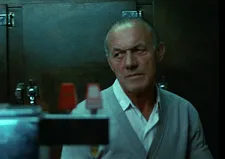 |
| Joseph Oberhauser working at the beer hall in Claude Lanzmann’s Shoah |
AB: Yeah, North Korea and hunted down Nazis and I was like, okay, I’ve got to see the documentary on this guy! He was 85 at that point. When I realized that there wasn’t one - and fortuitously I had seen not so long ago The Fog of War, which was a very influential film for me - it showed that you can take someone who’s 87 and just put them on camera and let them recount their life. If their life is epic enough, it doesn’t need much more than that. It doesn’t need to be a documentary in 3D or with animation. So I approached him and he said “No.” But I was persistent.
The breakthrough came when I said I had a friend at the BBC in England who ran a strand called Storyville, Nick Fraser. I said, “Look, 2015 will be the 30th anniversary of Shoah, so you should program it. It hadn’t been shown on British television since 1987. I’ll do a new documentary to go with it.” He liked that idea very much and said, “Look I can’t give you any money, obviously you’re a first-time filmmaker.” I said “Just write me a letter on BBC headed paper and say you want to license Shoah and you want a new interview for a documentary to go with it.” And Lanzmann said yes immediately to that. So Nick and I traveled to Paris and met with him and convinced him and set to work on the film. I was aware that there was some 200 hour plus of outtake material that was put in the Holocaust Memorial Museum in Washington D.C. and that was in the public domain.
AKT: 350 hours altogether, right?
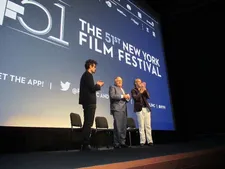 |
| Claude Lanzmann presenting The Last Of The Unjust with Kent Jones at the 51st New York Film Festival |
AB: 225 hours. I don’t know if you want to print this or not, but Lanzmann began early after the release of Shoah saying there were 250 hours of outtake footage and that at some point became 300 and then in his later stories it became 350. He had a broad view of how to promote the work that he did. The other thing that the Holocaust Memorial Museum said to me was that when they bought this footage from him, 225 hours, almost all of it digitized now, that there was no sort of method to it in terms of how it was sorted. No logbook or anything, just a whole bunch of canisters that had stickers saying things like “Sur la plage, Israel.”
AKT: I met him twice, the first time in connection to The Last of the Unjust and the other one was for the Four Sisters.
AB: He must have been very old at that point.
AKT: Yes, but very much alive, very present, adventurous.
AB: He worked constantly, travelled constantly right up until his death and I think that’s a factor why he lived so long.
AKT: What he said was “I’m the only one who could make these films out of the material of the outtakes that was there.” As you said, no method, it was his method, it was in his head.
Adam sent me a follow up on the crow story: “The landlord and I went up to the roof and looked down the chimney, but couldn’t see the crow anymore. Hopefully it dislodged itself and was able to fly away.”
Coming up - Adam Benzine on Claude Lanzmann: Spectres of the Shoah continues.
Claude Lanzmann: Spectres of the Shoah will be available on Vimeo on Demand starting this Wednesday, April 7.








